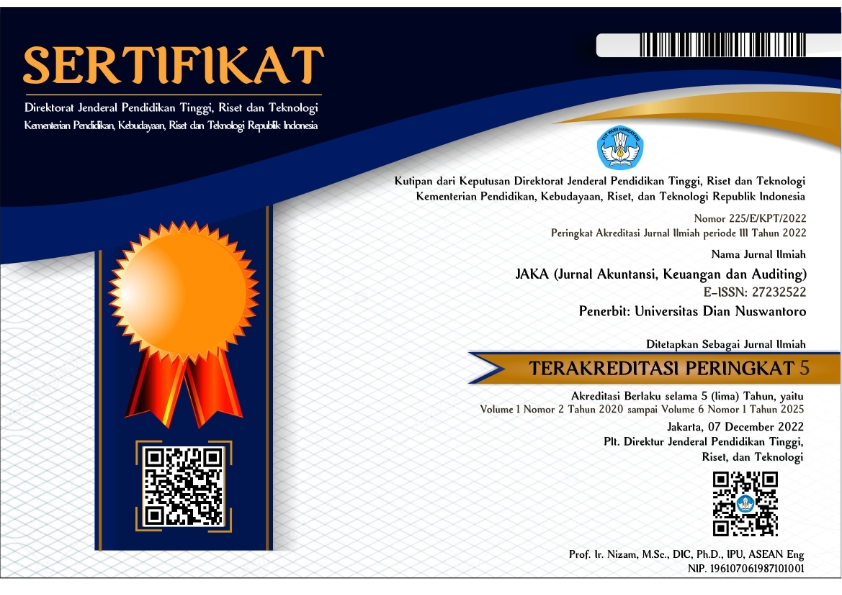Prepektif Abu Yusuf Dan Ibnu Khaldun Dalam Konsep Dan Kontribusi Perpajakan Terhadap Perekonomian Di Indonesia
DOI:
https://doi.org/10.56696/jaka.v3i2.8851Abstract
Tax is the largest source of state revenue, the collection of which is borne by the taxpayer. As the country's largest source of income, the government as the tax authority seeks every year to increase revenue from the tax sector. Donations from taxpayers will be processed by the government and used to fund development and public services. In Islam, the concept of tax (dharibah/jizyah) is defined as obligatory donations from the community to the state in accordance with the provisions, namely based on laws that are coercive and used for public spending. In its development jumhur ulama' tend to use the word dharibah to refer to taxes, as assets collected as an obligation. Related to his views on the economy, Ibn Khaldun based his views on the principles of development and social welfare. This also applies in matters of taxation, Ibn Khaldun based his thoughts on taxation on the principles of fairness and proportionality. This is reflected in several of his works in the field of economics in general, and taxation in particular, such as the Muqoddimah book. In the Muqoddimah book, Ibn Khaldun explains that the most important factor for creating a profitable business atmosphere is to lighten as much as possible the tax burden on business people, with the aim of promoting the business world by guaranteeing greater profits.The purpose of this research is to explain the concept of the perspective of Abu Yusuf and Ibn Khaldun in the concept and contribution of taxation to the Indonesian economy. In the context of the perspectives of Abu Yusuf and Ibnu Khaldun and the contribution of taxation, can they increase the perspective that is in their minds, at least has it been implemented in Indonesia in order to advance Indonesia and improve people's welfare, especially in improving the Indonesian economy by using tax money in things that develop Indonesia, such as creating comfortable workplaces and facilities. This research uses normative juridical research (legal research), namely research that uses materials from written regulations or other normative legal materials. By using the deductive thinking method (a way of thinking in drawing conclusions drawn from something of a general nature that has been proven that he is right and the conclusion is intended for something special). The research approach is a historical approach (historical approach) and a concept approach (conceptual approach). What is meant by a conceptual approach (conceptual approach) is an approach based on the doctrines and views developed in the science of law.Abu Yusuf's concept and contribution of taxation to the economy in Indonesia is very fair, because the government collects taxes in a balanced or equitable manner according to the assets or wealth he has, for example, such as property tax based on how big the house is, vehicle tax, company tax also depending on how much profit he makes. company owned. So that Abu Yusuf's thoughts regarding taxes are very good to apply especially to agricultural or mining taxes because the taxation is not based on money but can be used for the harvest to be given to the state as a source of tax, so the government will collect the harvest and sell it to the community with affordable prices, or can also be given to people who have a shortage of daily necessities. Meanwhile, according to Ibnu Khaldun, taxes are only collected when the government does not hinder production and trade activities. The tax applied must be of a legal type and in accordance with Islamic law. Taxes are aimed at maintaining the stability (security) of citizens, people's welfare, justice and equity, but in Indonesia the tax system is very valid but people's appreciation in paying taxes is still lacking, especially the PBB tax.However, it can be concluded that the implementation of the existing tax system in Indonesia is the same as the thinking of Abu Yusuf and Ibn Khaldun, the only difference being the tax collection system.References
Al Haq, Syaif Dan Kurniasih Bahagiati. (2022). Pajak Terhadap Bahan Pokok Perspektif Ibnu Khaldun. Jurnal Hukum Islam Dan Pranata Sosial Islam, 10(1).
Al-Kaaf Dan Abdullah Zakiy. (2002). Ekonomi Dalam Perspektif Islam. Pustaka Setia.
Amalia, Euis. (2005). Sejarah Pemikiran Ekonomi Islam Dari Masa Klasik Hingga Kontemporer. Pustaka Asatruss.
Efendi, Jonaedi. (2018). Metode Penelitian Hukum Normatif Dan Empiris. Prenadamedia Group.
Enan, Abdullah. (2013). Biografi Ibnu Khaldun: Kehidupan Dan Karya Bapak Sosiologi Dunia. Zaman.
Gusfahimi. (2011). Pajak Menurut Syari’ah (Edisi Revisi). PT Raja Grafindo Persada.
Hamidah, Dkk. (2023). Perpajakan. Cendikian Mulia Mandiri.
Karim, Adiwarman Dan Azwar. (2004). Sejarah Pemikiran Ekonomi Islam. PT Raja Grafindo Persada.
Khaldun, Ibnu. (2017). Muqadimmah, Terj. Masturi Irham Dkk. Pustaka Al- Kautsar.
Majid, M. Nazori. (2003). Pemikiran Ekonomi Islam Abu Yusuf. Cet. I. PSEI STIS.
Maman, Surahman Dan Fadilah Ilahi. (2017). Konsep Pajak Dalam Hukum Islam. Jurnal Ekonomi Dan Keuangan Syariah, 1(2).
Mth, Asmuni. (2005). Pemikiran Ekonomi Abu Yusuf Dan Ibn Adam: Eksplorasi Awal Tentang Konsep Sumber Keuangan Negara. Jurnal Studi Agama, 4(2).
Muhaimin. (2020). Metode Penelitian Hukum. Mataram University Press.
Retno, Fanny. (2020). Pengetahuan Dan Kesadaran Masyarakat Dalam Kepatuhan Membayar Pajak Bumi Dan Bangunan Di Dusun Kalipanggang Desa Candirejo Tuntang. Jurnal Akuntansi Dan Pajak, 2(1).
Samudera, Azhari Azis. (2010). Perpajakan Di Indonesia: Keuangan, Pajak, Dan Retribusi Daerah. Gramedia Pustaka Utama.
Batubara, Sarmiana. (2020). Perbandingan Pemikiran Ekonomi Abu Yusuf Dan Adam Smith Tentang Sistem Pajak Serta Relevansinya Di Indonesia.
Syafiuddin. (2007). Negara Islam Menurut Konsep. Gema Media.
Tilopa, Martina Nofra. (2017). Pemikiran Ekonomi Abu Yusuf Dalam Kitab Al-Kharaj. Vol. 3(1).
Yulianti, Rahmani Timorita. (2022). Pemikiran Ekonomi Islam Abu Yusuf.
Yusri, Abdul. (2004). Historiografi Islam. PT Raja Grafindo Persada.
Downloads
Published
How to Cite
Issue
Section
License
Copyright (c) 2023 JAKA (Jurnal Akuntansi, Keuangan, dan Auditing)

This work is licensed under a Creative Commons Attribution-ShareAlike 4.0 International License.












